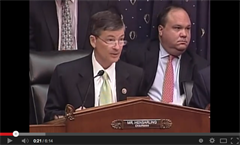|
WASHINGTON- House Financial Services Committee Chairman Jeb Hensarling (R-TX) delivered the following opening statement at today’s full committee hearing with Treasury Secretary Jacob Lew:
This morning we welcome back Secretary Lew back to discuss FSOC (Financial Stability Oversight Council). But before we do discuss FSOC, I would be remiss if I did not bring up the continuing scandal at the Internal Revenue Service, an agency that is part of Treasury.
Mr. Secretary, 13 months ago you appeared before us and said “my highest priority [is] to restore confidence in the IRS.” I think we both know, Mr. Secretary, that has not yet occurred.
Back then, President Obama said of the IRS scandal “the misconduct…is inexcusable and Americans are right to be angry about it and I am angry about it.”
He said his Administration would cooperate with Congress to uncover the truth. That’s what he has said; regrettably that is not what has happened.
In just the last few days we’ve learned the Administration has known since at least February that years’ worth of IRS emails of seven IRS employees at the epicenter of the scandal have simply vanished. How terribly convenient for the Administration but how inconvenient for the American people who expect equal protection under the law.
The American people, regrettably but understandably, are becoming increasingly cynical and fearful of their government. There is a growing resentment of one set of rules for Washington and another set of rules for everyone else. In other words, no one believes that simply saying, “Sorry I’ve lost my emails” is an excuse the IRS would accept from a taxpayer being put through a torturous audit.
Mr. Secretary, I trust you agree the American people deserve better. It is past time for openness and transparency from this Administration about what you told this committee 13 months ago is your “highest priority.”
It’s also past time for openness and transparency at FSOC, which you chair, Mr. Secretary. While you and other Administration officials habitually cite the purported dangers to financial stability posed by the “shadow banking system,” you ignore those presented by the “shadow regulatory system” of which FSOC is front and center.
Indeed, with the exception of agencies dealing in classified information relating to national security, FSOC may very well be the nation’s least transparent federal entity. The public cannot view their proceedings, because two-thirds of them are conducted in private executive sessions. And when minutes are produced, on average they weigh in at a mere five pages long with half the pages devoted to memorializing attendees’ names and resolutions considered.
Better Markets, a public interest group that consistently advocates for more regulation of our financial sector, has stated: “The FSOC’s proceedings make the Politburo look open by comparison. No one in America even knows who they are. At the few open meetings they have, they snap their fingers and it’s over, and they are all scripted. They treat their information as if it were state secrets.”
To begin to remedy this sad situation is one of the reasons this committee has ordered H.R. 4387, The FSOC Transparency and Accountability Act, favorably reported to the House.
The reason transparency and accountability are so important is because FSOC can designate practically any large financial firm in our nation as a Systemically Important Financial Institution, a SIFI, and thus render effective control over it. Thus, it has the ability to render great damage to our economy and set back the dreams of tens of millions of unemployed and underemployed Americans who are counting on their capital markets to work for them.
Recently, Douglas Holtz-Eakin, the former director of CBO, has estimated that designating asset managers as SIFIs could cost investors as much as 25% of the return on their investments over the long term or approximately $108,000 per investor. In other words, as it operates in the shadows, FSOC can take away the seed capital necessary to launch a small business or send a child to college. That is both unfair and unwise.
And while FSOC seems dead set on trying to find systemic risk where no one else seems to find it, a review of their latest report indicates it is willfully blind to the largest sources of systemic risk. Hardly a mention of Fannie Mae or Freddie Mac; they were at the epicenter of the last financial crisis. And without the leadership of the Administration to end permanent taxpayer subsidies, they are certain to be at the center of the next financial crisis.
No mention of the federal government itself. $17 trillion in debt and growing, more debt incurred under this Administration than in our nation’s first 200 years. Our offices are all awash with CBO and independent reports saying the pace of spending is unsustainable. But rather than rein in government spending or prioritize interest payments on the debt, the Administration regrettably turns a blind eye and has threatened to even allow default on our sovereign debt.
So this committee has also passed H.R. 4881 to place a one-year moratorium on further designations of non-bank SIFIs. Again Mr. Secretary, I would call on FSOC to cease and desist with these designations so Congress can have time to conduct effective oversight and get answers to questions both Republicans and Democrats have raised about FSOC’s decision-making process.
###
|





